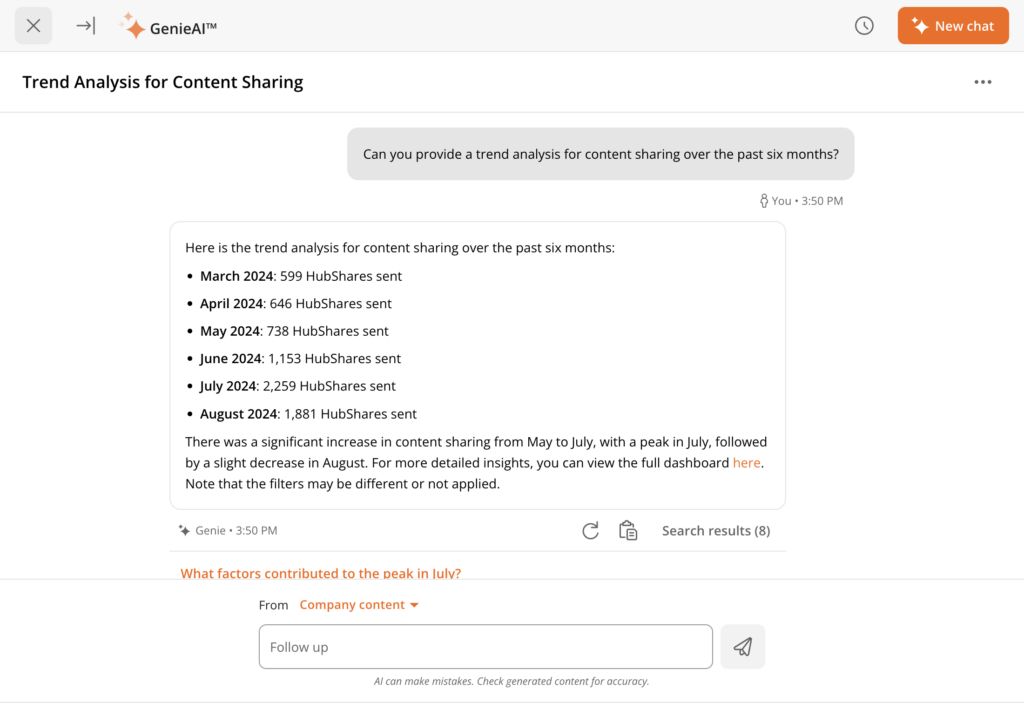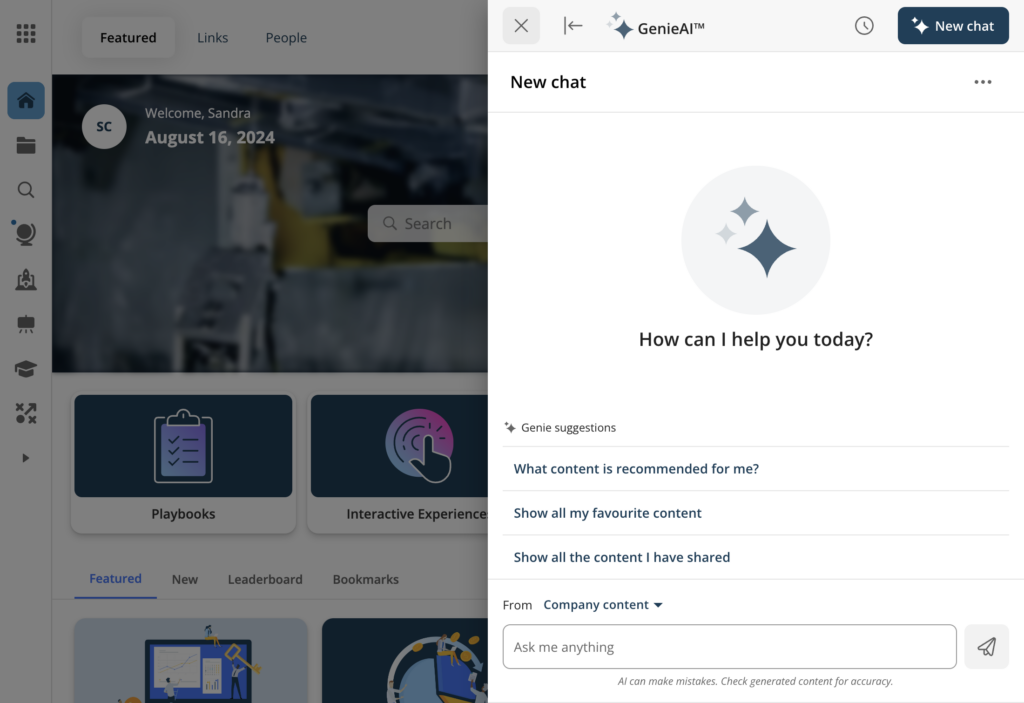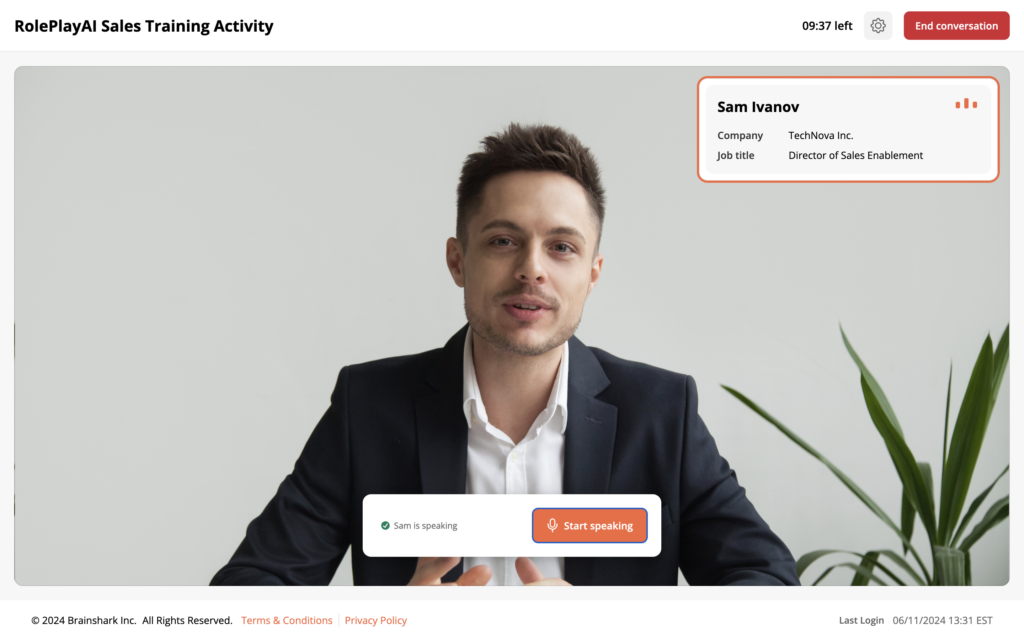It’s 30 minutes before your customer meeting, and you’re frantically searching for that perfect case study to seal the deal. Your inbox is overflowing, your desktop’s a mess, and you can’t remember if the latest product specs are in Slack or Dropbox (or buried in a forgotten email thread).
Or maybe you’re an SDR, staring at a list of 100 prospects, trying to craft personalized outreach that doesn’t sound like a robot wrote it (or worse, like every other sales email cluttering your inbox).
These are the moments an AI-assisted sales process helps sellers avoid.
Because AI-assisted sales isn’t about replacing you with a slick-talking robot. It’s about giving you an intelligent helper that keeps things organized and handles the tedious stuff so you can focus on what you do best: building relationships and closing deals.
Those that get this are seeing results — a Salesforce report shows sales teams using AI are 1.3x more likely to see a revenue boost.
How is that possible?
Let’s dive into how AI transforms the sales process.
What is AI-assisted sales?
AI-assisted sales is the use of artificial intelligence software to enable salespeople to do their jobs better. It’s like giving each rep a personal assistant that can quickly analyze information, suggest the best ways to talk to customers, and help with repetitive tasks.
This technology doesn’t replace salespeople — it gives them tools to work more efficiently. For example, it may help find the most promising potential customers, suggest the best time to contact them, or even help write personalized emails. The goal is to let salespeople focus more on building relationships and closing deals, rather than getting bogged down in paperwork or data analysis.
It works behind the scenes to:
- Instantly surface the most relevant content or training for your pitch
- Analyze your sales calls and give you useful tips to improve
- Predict which leads are most likely to convert
- Craft personalized outreach that resonates with prospects
But here’s the thing: you don’t need to be a tech wizard to use AI in your sales process. Many tools willingly combine with your existing systems, making them easy to adopt.
This is why Salesforce found 81% of sales teams are either experimenting with or fully adding AI to their daily tasks.
So, if you’re ready to spend less time drowning in busywork and more time crushing your quota, it’s time to embrace AI-assisted sales.
Benefits of AI-assisted sales
Sales teams everywhere are switching out old tactics for the AI advantage. Using artificial intelligence, sales professionals can eliminate distractions and focus on skill development and networking.
So let’s explore AI’s benefits to the sales process.
Make sales processes more efficient and productive
AI takes care of the time-consuming tasks that often bog down sales reps, allowing them to focus on high-value activities. This shift in focus can significantly improve overall productivity and job satisfaction.
Imagine starting your day without the dread of data entry or report generation. With AI handling these tasks, you can dive into meaningful conversations with prospects.
For example, an AI assistant could automatically update your CRM after each call, saving you precious minutes that add up to hours over time. AKA more time for strategizing, personalizing your approach, and closing more deals.
Improve lead scoring and prioritization
AI excels at analyzing vast amounts of data to identify patterns and predict outcomes. This capability transforms how sales teams approach lead scoring and prioritization.
Think of what you could do with insights that tell you which leads will most likely convert. That’s essentially what AI-powered lead scoring does. It considers past behavior, activity levels, and demographic information to assign accurate scores to each lead.
A sales rep with this insight can focus their energy on the most promising prospects, increasing their chances of success.
For instance, AI may flag a lead who’s been visiting your pricing page frequently, indicating they’re close to making a decision — allowing you to reach out at just the right moment.
Personalize customer interactions
AI helps sales professionals tailor their approach to each customer, creating more meaningful and effective interactions.
No more 20th-century one-size-fits-all sales pitches. AI analyzes customer data to reveal their preferences, pain points, and buying behavior. This way, you can craft personalized messages that resonate with each prospect.
For example, if AI detects a potential customer researching a specific product feature, you can address that in your next conversation, showing you understand their unique needs.
Make informed decisions based on data
With AI, sales teams can make more informed decisions based on concrete data rather than gut feelings or outdated information.
AI is a personal data analyst, constantly crunching numbers and spotting trends you may miss. It predicts which deals are most likely to close, forecasts revenue with greater accuracy, and even suggests the best times to follow up with prospects. This level of insight allows sales leaders to allocate resources more effectively and adjust strategies in real time.
For instance, if AI detects a sudden increase in interest from a particular industry, you can quickly pivot to capitalize on that trend.
Streamline administrative tasks
AI handles repetitive administrative work, freeing up sales reps to focus on building meaningful relationships with prospects and customers.
Imagine never worrying about scheduling conflicts or forgetting to follow up with a prospect again. AI handles these tasks effortlessly, ensuring nothing falls through the cracks. It automatically schedules meetings, sends follow-up emails, and even generates basic reports. This saves time and reduces the mental load on sales reps, so they can bring their A-game to every customer interaction.
For example, an AI assistant could remind you to reach out to a prospect who went cold three months ago, rekindling a potentially valuable relationship you might’ve otherwise forgotten.
How AI-assisted sales works
AI-assisted sales tools help you crush your quota without breaking a sweat. But how do these tools make this happen?
Let’s break it down some of the ways AI is predicted to fulfill 60% of the sales tasks by 2028.
Understanding human communication
One of the coolest tricks up AI’s sleeve is its ability to understand and analyze human communication. This is where natural language processing (NLP) comes into play.
NLP is your personal translator for sales conversations. It picks up on your customers’ tone, emotions, and key points. For example, it may flag when a prospect sounds excited about a particular feature or is hesitant about pricing. This insight helps you tailor your approach on the fly, making your conversations more effective.
Predicting the future (well, almost)
AI is also proficient at crunching numbers and spotting patterns. This is where machine learning shines. It’s like a dynamic roadmap that refines its routes based on real-time traffic and historical patterns.
By analyzing tons of sales data, AI predicts which leads are most likely to convert, when a deal might close, or even which products a customer may be interested in next. The best part? It keeps learning and improving as it goes. So, the more you use it, the smarter it gets.

Making sense of visual information
AI doesn’t just read text — it can “see” too, thanks to its computer vision. It’s like giving your sales tools a pair of eagle eyes.
Computer vision (optical character recognition or OCR) can analyze images and videos, helping you understand how customers interact with your visual content. For instance, it may tell you which parts of your product demo video are most interesting or which slides in your pitch deck are getting the most attention.
Playing nice with your other tools
The real magic happens when AI plays nicely with your existing sales tools. It’s not about replacing what you already use — it’s about making those tools work even better.
AI can pull data from your CRM, analyze it, and feed insights into your workflow. This means you’re always working with the most up-to-date, relevant information. No more switching between a dozen tabs or manually updating spreadsheets.
Putting it all together
When you combine all these AI capabilities, you get a sales process that’s smarter, faster, and more personalized. You get an all-in-one team with expert analysts, coaches, and assistants.
AI can help you prioritize your leads, suggest the best times to reach out, recommend the most relevant content to share, and even help you craft the perfect email.
Remember, AI is here to make you better at what you’re great at and to improve the areas you lack. It handles the number-crunching and data analysis so you can focus on the human side of sales.
Top ways to use AI-assisted sales
AI-assisted sales improve sales team operations and boost efficiency. Here are some key applications:
1. Lead generation and qualification
AI algorithms analyze tons of data to identify high-potential leads, saving time and improving targeting accuracy.
These tools can:
- Automatically enrich lead profiles with data from multiple sources
- Score leads based on likelihood to convert, helping prioritize outreach
- Identify patterns in successful deals to refine ideal customer profiles
For example, an AI tool could flag a customer whose communication has slowed over the past month as a high-priority prospect ready for outreach.
2. Sales forecasting and pipeline management
AI-powered forecasting tools provide more accurate predictions by:
- Analyzing historical data and current pipeline to estimate deal close probabilities
- Identifying at-risk deals early, allowing for timely interventions
- Suggesting actions to move deals forward based on successful past strategies
An AI system might alert a sales rep that a deal has a 70% chance of closing this quarter based on similar past deals and recent customer interactions.
3. Content recommendations and personalization
AI helps sales reps deliver the right content at the right time by:
- Suggesting relevant materials based on prospect characteristics and behavioral history
- Automatically personalizing content for specific accounts or industries
- Tracking content performance to continuously refine recommendations
When a sales rep is preparing for a call with a healthcare prospect, the AI may recommend a case study from a similar healthcare company that recently succeeded with your product.

4. Conversation intelligence and call analytics
AI tools analyze sales calls and meetings to provide practical insights by:
- Transcribing and summarizing key points from conversations
- Identifying successful talk tracks and objection-handling techniques
- Providing real-time coaching suggestions during calls
During a sales call, an AI assistant could prompt a rep to discuss a specific feature that has resonated well with similar prospects in the past.
5. Sales training and coaching
AI enhances sales training programs through:
- Personalized learning paths based on individual performance data
- AI-powered role-play simulations for practicing pitches and objection handling
- Automated performance feedback and improvement suggestions
A new sales rep may receive an AI-generated training module focused on areas where they’ve struggled in recent calls, such as handling pricing objections.

Implementing AI-assisted sales
Incorporating AI is a legit way to improve your sales process. Here are the steps to make it happen without losing your mind (or your human touch).
Assessing readiness for AI integration
Before jumping in headfirst, take a step back and look at your current sales setup. Are your processes documented? Is your data clean and organized? Do you have a clear idea of where AI could make the biggest impact?
Start by evaluating your current sales processes and tech stack. If your team spends hours manually updating CRM records each week, that’s a prime candidate for AI automation. AI can help streamline this process, automatically updating records and providing insights based on sales interactions.
Next, identify key pain points and opportunities for AI implementation. Maybe your reps struggle with personalizing outreach at scale or spend too much time searching for the right content. These are areas where AI can really shine.
Finally, assess your data quality and availability. AI is only as good as the data it’s trained on. If your data is a mess, clean it up before bringing in AI tools.
Steps for successful implementation
Getting push-back from your team? Tell them this: 84% of salespeople say generative AI has already proven to increase sales by speeding up customer interactions.
- Define clear objectives and success metrics for your AI initiatives. What exactly do you want to achieve? More efficient prospecting? Faster deal closures? Better customer retention? Be specific and measurable.
- Select the right AI tools for your needs. Bigtincan offers a suite of AI-powered solutions, from Conversation Intelligence for analyzing sales calls to Content Authoring for creating personalized sales materials.
- Start with a pilot test. Choose a small team or specific use case to test your chosen AI tools. This lets you iron out kinks and gather feedback before a full rollout.
- Roll out in phases. Don’t try to overhaul your entire sales process overnight. Gradually introduce AI tools, starting with the areas with the biggest impact.
- Monitor and optimize continuously. AI isn’t a “set it and forget it” deal. Keep a close eye on performance and be ready to make adjustments.
Potential challenges and how to overcome them
Data privacy and security concerns are often at the forefront of people’s minds when adopting AI. Bigtincan’s Secure GLP platform allows you to control what information flows in and out of your AI systems, ensuring compliance with data protection regulations.
Integration with legacy systems can be tricky. Look for AI solutions that offer solid APIs and connectivity capabilities. Bigtincan’s platform plays nicely with your existing tech stack.
But let’s not forget user adoption, which can make or break your AI implementation. Combat resistance by clearly communicating the benefits of AI tools and providing thorough training. Show your team how AI can make their jobs easier, not replace them.
Ensuring data quality and model accuracy is an ongoing process. So, regularly audit your data and AI models to maintain peak performance.
Change management considerations
Most people hate change, especially when they don’t understand why it’s happening.
So, develop a comprehensive communication strategy to keep everyone in the loop. Explain why you’re implementing AI, how it will benefit the team, and what changes they can expect.
Provide thorough training and support for your sales teams. Bigtincan’s Readiness platform offers adaptive training modules to help your team get up to speed quickly with new AI tools.
And don’t overlook aligning incentives and KPIs with AI-driven processes. If you want your team to embrace AI, ensure their goals and rewards reflect that.
Best practices for AI-assisted sales
AI is a powerful tool, but like any tool, it’s most effective when used properly. Here are some best practices to help you get the most out of AI-assisted sales.
Ensure data quality and privacy
Garbage in, garbage out — this old programming adage applies to AI, too. Your AI tools are only as good as the data you feed them.
So, start by creating data governance policies. This means setting clear rules about what data you collect, how you store it, and who can access it. Regular data cleansing and validation processes are crucial. Think of it like spring cleaning for your database — get rid of outdated info, fix errors, and ensure everything’s where it should be.
Bigtincan’s Secure GLP (Generative Language Processing) platform allows you to control what information flows in and out of your AI systems. You can use only your internal content or selectively allow external data sources, ensuring compliance with data protection regulations like GDPR and CCPA.
Train sales teams on AI tools
Introducing new tech can be like bringing home a puppy — exciting, but there’s a learning curve (and requires lots of patience). The best way to get everyone up to speed: comprehensive onboarding programs.
But don’t just show your team how to use the tools — explain why they’re valuable. Share success stories and concrete examples of how AI can make their jobs easier and more effective. Consider creating AI champions within your sales organization — these early adopters can help their peers get comfortable with the new tech.
Bigtincan’s Readiness platform offers AI-powered training modules that adapt to each user’s learning style and pace. Use RolePlayAI to create realistic sales scenarios for practice, allowing reps to hone their skills in a safe environment before facing real customers.
Balance AI insights with human expertise
AI is smart, but it’s not psychic. So, emphasize that AI is a tool to augment, not replace, human judgment.
Encourage your team to think critically about AI recommendations. If something doesn’t feel right, it’s okay to question it. Establish clear guidelines for when to rely on AI vs. human decision-making.
For instance, AI may be great at identifying promising leads, but the final decision on approaching a high-value prospect should involve human insight.
Use Bigtincan’s Genie Assistant to handle routine tasks and data analysis, freeing your sales reps to focus on solving complex problems. After all, empathy and creativity are still uniquely human traits — for now, at least.
Continuously monitor and optimize
Implementing AI isn’t a crockpot you can set and forget. It’s more like tending a garden — it needs regular attention to thrive.
So, set up a system for regular performance reviews of your AI models and algorithms. Are they delivering the results you expected? Are there areas where they’re falling short?
Don’t be afraid to experiment. Try A/B testing AI-driven strategies against traditional approaches to see what works best for your team and customers.
Bigtincan’s analytics dashboards provide real-time insights into your AI tools’ performance. Use these metrics to continuously refine your AI strategies and ensure they’re aligned with your sales goals.
AI-assisted sales: The future is now
AI isn’t coming to take your job — it’s here to make you better at it. By embracing AI tools and best practices, sales teams can work smarter, close deals faster, and deliver better experiences for their prospects and customers.
Remember:
- Start small and build confidence with AI tools
- Focus on using AI to enhance human skills, not replace them
- Continuously monitor and optimize your AI-assisted processes
- Keep security and data privacy at the forefront
Bigtincan’s suite of AI-powered revenue enablement tools is designed to give your team an edge. From GenieAI’s intelligent content discovery to Conversation Intelligence’s real-time coaching, we’re here to help you crush your quota and leave the competition in the dust.
Ready to enhance your sales process with AI? Let’s chat.
